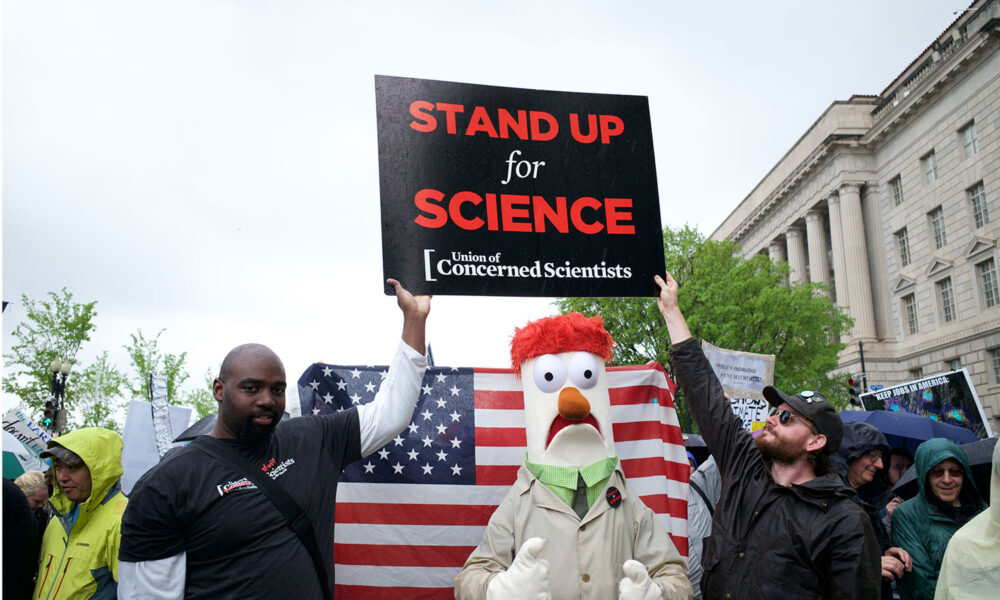Scientists love science. They love beakers, notebooks, sharp pencils, and pristine lab coats. They love math, physics, chemistry, and engineering. They love a nuanced hypothesis and a meticulously run experiment.
But above all, scientists love to win. And let’s just say, our team of concerned scientists is head over heels for California right now.
In a year dominated by headlines of federal rollbacks, high electricity and gasoline prices, and general disarray, climate champions in the California Legislature kept their heads down and churned out a staggering suite of game-changing policies.
Against all odds, climate advocates and the California Legislature extended (and renamed) California’s landmark Cap-and-Trade Program, made electricity more affordable, got serious about a fast-and-fair fossil fuel phaseout, and made the state’s grid more reliable.
There’s much more to do to ensure our transition to a cleaner future is lightning fast and doesn’t leave anyone behind. But just for the time it takes you to read this blog, let yourself marinate in the soothing afterglow of a job well done. You’ve earned it.
Capping emissions and investing in the future
The legislature extended and strengthened California’s Cap and Trade program and—learning from the branding brilliance of Washington State—renamed it Cap and Invest.
This seminal climate program sets a declining cap on global warming emissions and generates billions of dollars in funding for clean energy, zero emission transportation, wildfire resilience, transit, and more.
The program was set to expire at the end of the decade. Rather than letting the program and market flounder in uncertainty, the legislature proactively extended the program to 2045. Policymakers also took the opportunity to strengthen the program via Assembly Member Irwin’s Assembly Bill (AB) 1207 in three keyways:
- Explicitly requiring global warming emissions to decline in line with the state’s necessarily ambitious climate targets
- Redirecting ratepayer subsidies from fossil gas to electricity, decreasing the cost of the fuel of the future (an idea UCS championed with UCS Board Member Dr. Kyle Meng)
- Allowing emission allowances to be distributed based on an industry’s risk of leaving the state
The final package of bills also included Senate Bill (SB) 840 by Senator Limón which includes historic funding for transit and preserves the legislature’s discretion in investing $1 billion in clean transportation, energy, and resilient communities every year.
A regional and resilient grid
With AB 825 by Assembly Utilities and Energy Chair Petri-Norris, the legislature landed a long-fought effort to allow California to better collaborate with neighboring states to meet its clean energy needs.
This law will allow California to better coordinate with other western states to meet its electricity demand with clean wind, solar, and hydro and export its excess renewables. This will make the state’s grid more resilient while saving ratepayers money.
Long time readers will know that UCS has a history with this issue. We were aggressively neutral on previous, failed proposals and worked to educate the public and policymakers on the benefits and risks of this proposal. Our expertise was leaned on during an extensive stakeholder process which culminated in us supporting AB 825 and expressing our exuberance on the new-and-improved proposal with help from Sabrina Carpenter.
Lower transmission costs and electricity bills
This session was dominated by concerns about California’s rising electricity bills. High bills disproportionately burden low-income Californians and jeopardize the state’s transition to electric cars and trucks.
From the jump, UCS backed a proposal to allow for the public financing of the big wires that take electricity from clean energy generators to homes and businesses (aka Transmission). While transmission is costly, expanding transmission infrastructure is critical to facilitating the clean energy transition and accessing low-cost clean energy solutions for consumers. Transmission is typically financed by Investor-Owned Utilities like PG&E who borrow money at a high interest rate. Then, they pass those costs onto you and me in our bills.
Among other cost-saving policies, SB 254 by Senator Becker included a provision allowing the state to use its excellent credit score to finance transmission at a lower rate and pass those saving onto ratepayers.
Stabilizing the transition
California is transitioning away from gasoline in favor of electric cars and trucks. It is not just a vision or ambition; it is really happening.
The oil industry knows it too, which is why two refineries have announced plans to leave the state in the past year. However, most Californians continue to rely on gasoline to meet their everyday needs and without careful planning, these refinery closures could mean fuel shortages and price spikes for vulnerable populations.
UCS has been advocating (at times with the help of Chappell Roan) for a fast but stable transition that prioritizes communities and affordability. We worked with Vice Chair Gunda at the California Energy Commission on recommendations that ensure impending refinery closures will not overburden Californians at the pump nor undermine our transition to a cleaner future.
Some of the recommendations ended up in legislation along with a requirement that state agencies study a UCS proposal to introduce competition to California’s rigid gasoline market and provide funding to replace dirty, old cars with EVs.
Separately, the legislature directed $25 million to replacing pre-2004 vehicles, which a UCS analysis found are responsible for the majority of the state’s cars’ smog forming emissions. This was the idea behind AB 674 by Assembly member Connolly which we sponsored this year.
Science is for winners
California showed the world that we can have it all. We can lead the world by combating the climate crisis and transitioning the transportation sector away from fossil fuels while reducing costs.
How are we going to celebrate? The only way we know how: by cleaning our beakers, laundering our lab coats, sharpening our pencils, and getting back in the lab to find new solutions to California’s—and the world’s—most pressing issues.

